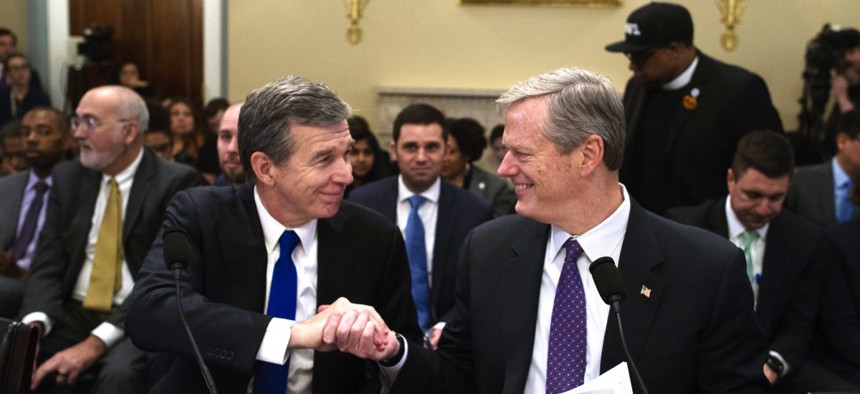Governors Request More Federal Support for Climate and Emissions Efforts

North Carolina Gov. Roy Cooper, left, and Massachusetts Gov. Charlie Baker shake hands Wednesday after testifying before the House Natural Resources Committee hearing on climate change in Washington, D.C. Cliff Owen / AP Photo
Expanding resilient infrastructure grants topped their list.
WASHINGTON — Massachusetts Gov. Charlie Baker on Wednesday urged Congress to increase federal support for state and local efforts to reduce emissions and expand new grants to make infrastructure more resilient before disasters.
Baker, testifying before the House Natural Resources Committee, said the Federal Emergency Management Agency’s work with states and localities to use analytics to identify risks and make investments was “one of the best ways” to collaborate because it reduces destruction when disasters do occur.
The Republican governor further advocated for the federal government setting emissions reduction targets that vary by state and region and researching climate adaptations like “the next breakthrough battery cell.”
North Carolina Gov. Roy Cooper, a Democrat who joined Baker on the congressional panel, agreed the federal government needs to help before the disaster.
“When storms are becoming more fierce, it’s not enough just to pick up the pieces,” Cooper said.
Cooper said he would like to see federal action consistent with the severity of climate-caused disasters states like his face and, in particular, assistance with smart infrastructure projects that can better prepare North Carolina for flooding.
North Carolina has experienced two “500-year floods” in the same number of years courtesy of hurricanes Matthew and Florence, which “decimated coastal communities and crushed coastal tourism and fisheries,” Cooper said. Homes were destroyed, and children went weeks without being able to go to school.
Meanwhile, Massachusetts saw four nor’easters last year affecting everything from coastal fisheries to skiing businesses.
The state has taken a number of steps to reduce emissions including hydropower and offshore wind procurement, which “over time are going to be more cost-effective than it would have been to use traditional resources,” Baker said. As a result, Massachusetts has cut emissions about 20 percent.
U.S. Rep. Tom McClintock, a California Republican, criticized a $10 million wind turbine project in Falmouth, Massachusetts for putting the city in debt, as well as causing noise and light complaints, and decreasing property values 20 percent.
Baker said the effort was “well-intended,” but unlike his state’s successful deepwater wind procurement bungled the siting of the turbines.
“I think sometimes, when everything doesn’t go the way it should go, everybody blames the concept,” Baker said. “Well, sometimes we just screw up the way we actually implement it, and that makes the concept look bad.”
Despite having zero oil or gas production, Massachusetts still requires about 1 quadrillion British thermal units of fossil fuels annually to operate, said U.S. Rep. Garret Graves, a Louisiana Republican.
Much of the 70 percent of coal- and natural gas-produced energy Massachusetts imports comes from Louisiana, where electricity prices are twice as high—generally among the top two states, Graves added.
“I think it’s important to recognize that states, in some cases, are fundamentally different,” he said.
North Carolina is the No. 2 producer of solar energy in the U.S., Cooper said, and the industry is now supported by both political parties because of the jobs it’s created and the fact the costs have become competitive over time.
Both North Carolina and Massachusetts have resisted the Trump administration’s efforts to expand offshore drilling to the Outer Continental Shelf off their coasts for fear of disrupting oceanic ecosystems and the threat of a catastrophic disaster.
“We’ve never heard of a catastrophic wind spill off our coast, so that seems like a prudent course,” said U.S. Rep. Jared Huffman, a California Democrat.
Republican lawmakers further contested the governors’ assertion that climate change has exacerbated wildfires out west.
McLintock, whose district encompasses parts of the Sierra Nevada mountains, argued wildfires have gotten worse since Congress passed environmental regulations in the 1970s curtailing the U.S. Forest Service’s ability to actively manage public forests. Removing excess timber that chokes off forests and suppressing brush is mostly done by private companies on their lands of late, he added.
“I think it’s quite clever of the climate to decimate only the lands that are hamstrung by these environmental laws,” McLintock said.
Cooper called for the balancing of environmental protections with resilience actions. Scientists and regulators should determine if active forest management is necessary, he said.
Dave Nyczepir is a News Editor at Route Fifty and is based in Washington, D.C.
NEXT STORY: What the Mayor of Youngstown Wants From Trump






